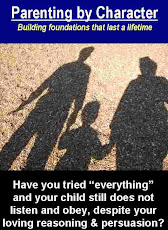- Am I giving my child routine chores to do at home (without paying them for it)?
- Am I constantly helping my child in his homework and protecting him from the consequences of his own negligence?
When your child is late in submitting his homework due to his own negligence, what do you do? If you step in too often and "chip in" and help, what message are you sending to the child? Personal accountability can only be learned if the child is left to experience the consequences of his actions (or lack of it). Certain things in life (especially character lessons) must be experienced and if we as parents step in constantly to "rescue" the child, we are doing them a disfavor! Effective parenting takes place when the child learns that lesson of cause and effect. Yes, it may mean a dip in their grades when you refuse to micro-manage but in the long term, you are parenting your child to stand on his own two feet rather than on yours. Isn't that what we desire in the long-term? So, make sure your daily actions do not contradict that long-term view!




